[高考英语]话题13 选修八 Unit 5 Meeting your ancestors Word版含答案
高考英语山东版:选修8 Unit+5 Meeting+your+ancestors
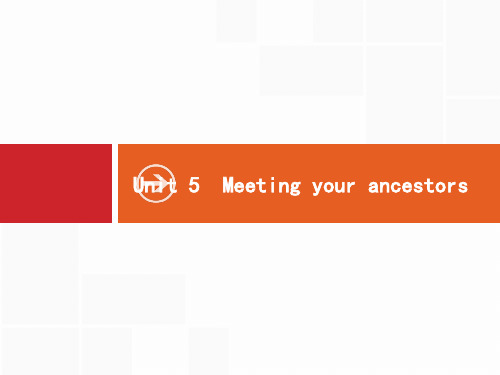
第八单元
考点一
考点二
核心素养专项提升
-5-
3.assume vt.假定;设想
[教材原句]So we think it is reasonable to assume they lived in
these caves,regardless of the cold.(P38)因此,我们有理由认为他们不
③你只有努力工作,才能实现自己的人生目标。
Only if you work hard can you achieve your life goal.
第八单元
考点一
考点二
核心素养专项提升
-11-
考点必记 ①if only后接句子,表示“要是……多好啊”,其后的句子中使用虚拟 语气。与现在事实相反时,动词用一般过去时;与过去事实相反时, 动词用过去完成时;与将来事实相反时用 “should/would/could/might+动词原形”。 ②only if引导条件状语从句,表示“只有在……时才……”,位于句首 时,主句用倒装语序。
Unit 5 Meeting your ancestors
第八单元
考点一
考点二
核心素养专项提升
-2-
1.alternative n.可能的选择 adj.供选择的;其他的 [教材原句]Can you think of the alternatives we would use
today?(P37)你能想到我们今天可供使用的选择吗? 语境巧练
第八单元
考点一
考点二
核心素养专项提升
-14-
8.only to do sth.做结果状语 [教材原句]Abruptly she sat down,only to be scooped up by her
高中英语优秀教案:Unit5 Meeting your ancestors(选修8)
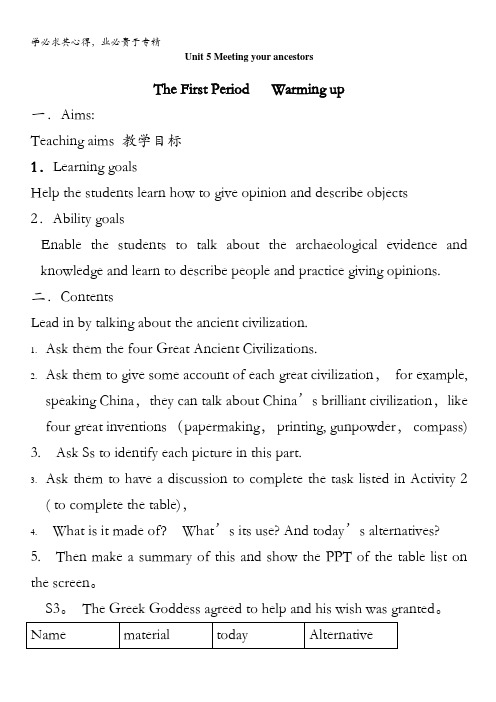
Unit 5 Meeting your ancestorsThe First Period Warming up一.Aims:Teaching aims 教学目标1.Learning goalsHelp the students learn how to give opinion and describe objects 2.Ability goalsEnable the students to talk about the archaeological evidence and knowledge and learn to describe people and practice giving opinions.二.ContentsLead in by talking about the ancient civilization.1.Ask them the four Great Ancient Civilizations.2.Ask them to give some account of each great civilization,for example, speaking China,they can talk about China’s brilliant civilization,like four great inventions (papermaking,printing, gunpowder,compass)3. Ask Ss to identify each picture in this part.3.Ask them to have a discussion to complete the task listed in Activity 2 ( to complete the table),4.What is it made of?What’s its use? And today’s alternatives?5. Then make a summary of this and show the PPT of the table list on the screen。
人教版高中英语选修八unit5 Meeting your ancestors.docx

高中英语学习材料***鼎尚图文理制作***unit5 Meeting your ancestorsⅠ.阅读理解AAn exhibition of models, 3-D images and videos has brought the Old Summer Palace, known as Yuanmingyuan, back to life, giving a fascinating insight into the life of China’s royal families. Sun Yuanqing reports.More than a century after it was looted (掠夺) and burned down, Y uanmingyuan has been restored to its former glory in a unique way.Exhibition Glory of the Yuanmingyuan, arouses the history and culture of Yuanmingyuan through models, 3-D images and videos. It is currently on display at the Chinese Culture Center in Moscow in celebration of the China-Russia Tourism Year.“It is a breakthrough in the history of Yuanmingyuan,” says Chen Yanying, co-curator (联合馆长) of the exhibition. “It is not meant to condemn the countries that took part in the turmoil (骚动), instead, it is going to send a positive voice, to let more people learn about and come to visit Yuanmingyuan.”Yuanmingyuan’s cultural relics, artworks and architecture that were looted or destroyed in the late 1800s and early 1900s, have now been brought to life on the touch panels. A miniature model of Haiyantang, the largest European garden in Y uanmingyuan, also made its debut (登场), along with replicas (复制品) of the 12 bronze zodiac animal heads that decorate its fountain.One of the highlights of the event is the various interactive (交互式) programs that allow visitors to not only appreciate, but also take part in the creation process of art, says Chen.“For people who know little about Yuanmingyuan, pictures alone can’t do it,” says Chen. “That’s why we need to develop experience centers to help people in other countries relate to Yuanmingyuan.”In the experience center of royal architecture design, visitors can try to build architecture models, discovering how Chinese architecture takes shape without using nails and glue.In the miniature Banmuyuan Garden, the place where the royal family watched opera, there are handmade embroidered (绣花的) costumes and puppets (木偶), which visitors can try on and pose for photographs with. In the imperial schoolroom, where the princes of the royal family used to study, visitors can learn Chinese calligraphy.语篇解读:本文是一篇说明文。
高考英语Unit5Meetingyourancestors要点梳理+重点突破新人教版选修8

选修 8Unit 5Meeting your ancestors要点梳理高效梳理·知考●重点1. alternative n.可能的adj.供的;其余的2. starvation n .挨;死→starve vi.挨;死3. accuracy n .精准;正确→accurate adj.正确的;精准的4. interrupt vt. & vi.打断⋯⋯;打岔;中断或中断5. assume vt.假设;想6. sharpen vi. & vt.(使)利;尖;清楚→sharpener n .磨具;削具7. messy adj.纷乱的;的→mess n .纷乱,8. botany n .植物学→ botanical adj.植物学的,与植物学相关的9. analysis n .剖析→ analyses pl.→ analyse vt.剖析→ analyst n .剖析者,化→analytic(al)adj.剖析的,分析的10. category n .种;;范围11. significance n .意;意思;重要性,重要意12. delete vt.;除13. somehowadv. 以⋯⋯方式;不知怎么地14. academy n .学院;学会;学体;院校15. applaud vi. & vt.鼓掌迎;→ applause n .鼓掌16. accelerate vi. & vt.加快;促17. arrest vt.逮捕;吸引 n .逮捕;拘禁18. dizzy adj.眩的;昏乱的;令人或疑惑的●重点短1. regardless of不论;不2. at most至多;最多3. cut up切碎4. fed up with受了;受;5. look ahead向前看;未来打算6. date back追忆到⋯⋯7. arrest sb.for ...因⋯⋯而逮捕某人8. with relief宽慰地9. be proud of...以⋯⋯傲10. turn to sb.for help 向某人求援●重点句型1. If only it could be just like last year!若是能跟昨年那有多好呀!2. It is a great pleasure to meet you students from England...到你些来自英国的学生特别高⋯⋯3. It must have been very uncomfortable.那一定会特别不舒畅。
人教版高中英语选修八 Unit5 Meeting youe ancestors-词汇篇(教师版)-精选教学文档
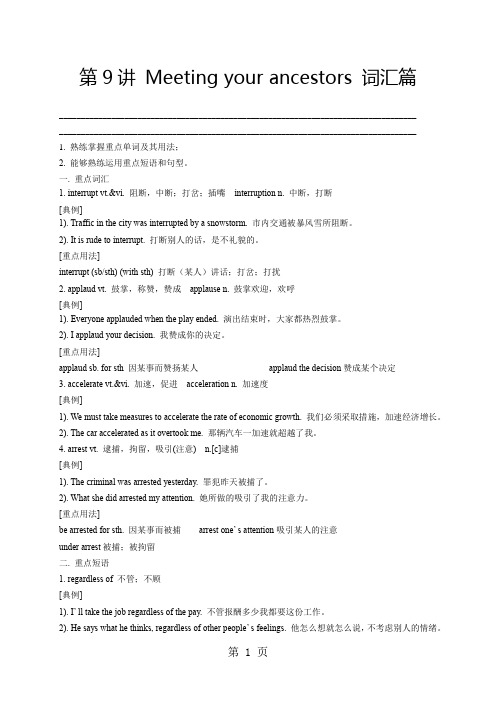
第9讲Meeting your ancestors 词汇篇____________________________________________________________________________________________________________________________________________________________________1.熟练掌握重点单词及其用法;2. 能够熟练运用重点短语和句型。
一. 重点词汇1. interrupt vt.&vi. 阻断,中断;打岔;插嘴interruption n. 中断,打断[典例]1). Traffic in the city was interrupted by a snowstorm. 市内交通被暴风雪所阻断。
2). It is rude to interrupt. 打断别人的话,是不礼貌的。
[重点用法]interrupt (sb/sth) (with sth) 打断(某人)讲话;打岔;打扰2. applaud vt. 鼓掌,称赞,赞成applause n. 鼓掌欢迎,欢呼[典例]1). Everyone applauded when the play ended. 演出结束时,大家都热烈鼓掌。
2). I applaud your decision. 我赞成你的决定。
[重点用法]applaud sb. for sth 因某事而赞扬某人applaud the decision赞成某个决定3. accelerate vt.&vi. 加速,促进acceleration n. 加速度[典例]1). We must take measures to accelerate the rate of economic growth. 我们必须采取措施,加速经济增长。
2). The car accelerated as it overtook me. 那辆汽车一加速就超越了我。
高考一轮复习英语讲义:选修八 Unit 5 Meeting your ancestors 含答案

Unit 5 Meeting your ancestors一、刷黑板——词汇全听写(先过识记默写关)Ⅰ.阅读词汇(英译汉)[第一屏听写]1.excavate v t.挖掘;发掘2.mat n. 席子;垫子3.quilt n. 被子;棉被4.beast n. 野兽5.onion n. 洋葱6.skateboard n. 滑板7.yogurt n. 酸乳酪;酸奶[第二屏听写]8.melon n.(各种)瓜9.wrinkle n. 皱纹10.spear n. 矛;枪11.eyebrow n. 眉毛12.arrowhead n. 箭头13.hammer n. 铁锤;锤子14.craftsmanship n. 技艺;手艺;精工细作15.punctuation n. 标点符号Ⅱ.高频词汇(汉译英)[第三屏听写]1.identify v t.确认;识别;鉴别2.alternative n. 可能的选择adj.供选择的;其他的3.archaeology n. 考古学(〈美〉archeology) 4.archaeological adj.考古学的;与考古学有关的(〈美〉archeological) 5.archaeologist n. 考古学家(〈美〉archeologist)[第四屏听写]6.starvation n.挨饿;饿死7.tentative adj.试探性的;不确定的8.accuracy n. 精确;准确9.interrupt v t.&v i.打断……讲话;打岔;暂时中断或中止10.acute adj.有观察力的;敏锐的;严重的;深刻的11.assume v t.假定;设想12.regardless ad v. 不管;不顾[第五屏听写]13.centimetre n.厘米(〈美〉centimeter)14.sharpen v i.&v t.(使)锋利;尖锐;清晰15.sharpener n. 磨具;削具16.kindergarten n. 幼儿园17.ample adj.足够的;充足的;富裕的18.messy adj.凌乱的;脏的19.primitive adj.原始的;远古的;简陋的20.seashell n. 海贝壳[第六屏听写]21.category n.种类;类别;范畴22.botany n. 植物学23.botanical adj.植物学的;与植物学有关的24.analysis n.(pl.analyses) 分析25.ripen v t.&v i.使……成熟;成熟[第七屏听写]26.significance n.意义;意思;重要性;重要意义27.somehow ad v. 以……方式;不知怎么地28.systematic adj.有系统的;有计划的;有条理的29.spit v t.吐出(唾液、食物等)v i.吐痰30.delete v t.删;删除31.album n. 相册;集邮册;唱片[第八屏听写]32.scratch n(刮、抓、划的)痕迹;搔;挠v t.搔;抓;擦伤;刮坏33.academy_ n. 学院;学会;学术团体;院校34.receptionist_ n. 接待员;招待员35.radioactive adj.放射性的;有辐射能的36.radioactivity n. 放射性37.division n. 分割;划分;分配;分界线[第九屏听写]38.pulse v i.强烈而有规律地跳动;搏动n. 脉搏;节拍39.applaud v i.&v t.鼓掌欢迎;赞赏40.howl v t.&v i.嗥叫;叫喊;吼叫n. 长嚎;嗥叫41.accelerate v i.&v t.加速;促进[第十屏听写]42.arrest v t.逮捕;吸引n. 逮捕;拘留43.dizzy adj.头晕目眩的;眩晕的;使人发晕或困惑的44.worship v t.&v i.崇拜;敬奉n. 崇拜;敬神45.skilful adj.有技巧的;熟练的(〈美〉skillful)[第十一屏听写]46.regardless_of_不管;不顾47.at_most 至多;最多48.cut_up 切碎49.fed_up_with 受够了;饱受;厌烦50.look_ahead 向前看;为将来打算51.date_back_(to_...) 追溯到;始于二、刷清单——热身自盘点(再过基本应用关)(一)核心单词(二)常用短语一、过重点单词——纵引横联超人一点1.alternative adj.供选择的;其他的n.可能的选择;选择对象[教材原句]Can you think of the alternatives we would use today?你能想到我们今天使用的替代品吗?[多角练透]单句语法填空①The Internet also provides us with a cheap alternative to communicating (communicate) with others.②In order to succeed, we have no alternative but to_face (face) failure bravely and learn from it.补全句子③You have_the_alternative_of_speaking_or keeping quiet.你要么发言,要么保持沉默。
选修8Unit5Meetingyourancestors优秀教案
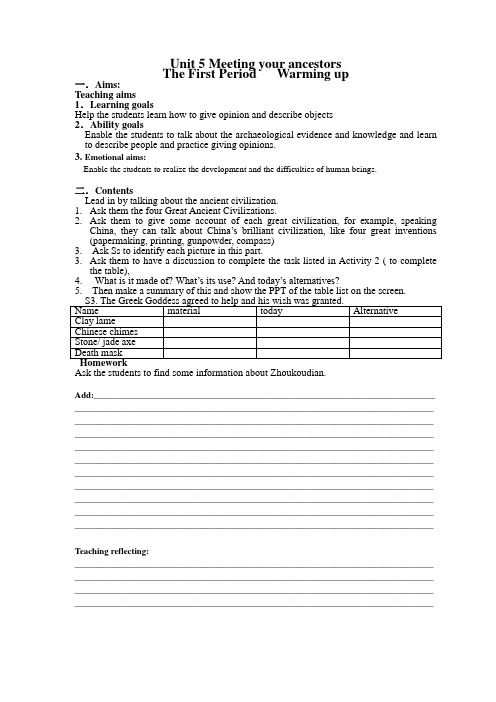
Unit 5 Meeting your ancestorsThe First Period Warming up一.Aims:Teaching aims1.Learning goalsHelp the students learn how to give opinion and describe objects2.Ability goalsEnable the students to talk about the archaeological evidence and knowledge and learn to describe people and practice giving opinions.3. Emotional aims:Enable the students to realize the development and the difficulties of human beings.二.ContentsLead in by talking about the ancient civilization.1.Ask them the four Great Ancient Civilizations.2.Ask them to give some account of each great civilization, for example, speakingChina, they can talk about China’s brilliant civilization, like four great inventions (papermaking, printing, gunpowder, compass)3. Ask Ss to identify each picture in this part.3.Ask them to have a discussion to complete the task listed in Activity 2 ( to completethe table),4.What is it made of? What’s its use? And today’s alternatives?5. Then make a summary of this and show the PPT of the table list on the screen.Ask the students to find some information about Zhoukoudian.Add:______________________________________________________________________________ __________________________________________________________________________________ __________________________________________________________________________________ __________________________________________________________________________________ __________________________________________________________________________________ __________________________________________________________________________________ __________________________________________________________________________________ __________________________________________________________________________________ __________________________________________________________________________________ __________________________________________________________________________________ __________________________________________________________________________________ Teaching reflecting:__________________________________________________________________________________ __________________________________________________________________________________ __________________________________________________________________________________ __________________________________________________________________________________The Second PeriodReading一.Aims:Teaching aims1. Target languagearchaeology, tentative, accuracy, excavate, interrupt, ornament, assume, regardless, sharpen, cut up, scrape, ample, primitive, preserve, bead, botany, botanical, analysis, specific, seashell, specifically 2.Ability aimsEnable the Ss to tell the differences between modern people and Peking man and learn how Peking man lived their lives.Content:Step I RevisionCheck the homework.The Ss will how their information about Zhoukoudian Caves in the following steps.Step II Lead in1.Ask the Ss to identify the picture in the pre-reading part. (skullcap)2.Ask Ss to assume what Peking man might have done and use thousands of years ago.1. Play the tape once, and ask the Ss what they have learned about Zhoukoudian Caves2. Skimm ing (What is the text about? And three stages of the archaeologist’s part of the dialogue: Anarcheologist is showing a group of students from England around the Zhoukoudian Caves and telling them something bout the caves.)3. Scanning (Ask them to write down the three ways in which the life of early people differs frommodern ones. Ask them to work in pairs and discuss the questions.Homes: Peking man lived in Zhoukoudian Caves of rocks and trees.Tools: They used needle that was made of bone sharpened stone tools and scraper made by stones. Dress: They wore clothes form animal skins and they also wore necklace made from seashells or animal teeth.4. Careful readingStep IV Post-readingAsk Ss to fill in the chart on the life and habits of Peking man on page 37 and compare it with the list they made in the pre-reading. What differences are there?And then to clarify Ss’ difficult points in the text.Step V HomeworkWrite a brief introduction to the Zhoukoudian Cave.Add:______________________________________________________________________________ __________________________________________________________________________________ ____________________________________________________________________________________________________________________________________________________________________ __________________________________________________________________________________ __________________________________________________________________________________ __________________________________________________________________________________ __________________________________________________________________________________ __________________________________________________________________________________ __________________________________________________________________________________ __________________________________________________________________________________ __________________________________________________________________________________ __________________________________________________________________________________ __________________________________________________________________________________ __________________________________________________________________________________ __________________________________________________________________________________ __________________________________________________________________________________ __________________________________________________________________________________ __________________________________________________________________________________ __________________________________________________________________________________ __________________________________________________________________________________ __________________________________________________________________________________ __________________________________________________________________________________ __________________________________________________________________________________ __________________________________________________________________________________ __________________________________________________________________________________ __________________________________________________________________________________ __________________________________________________________________________________ __________________________________________________________________________________ __________________________________________________________________________________ __________________________________________________________________________________Teaching reflecting:__________________________________________________________________________________ __________________________________________________________________________________ __________________________________________________________________________________ __________________________________________________________________________________The Third Period Language Points 一.Aims:Teaching aims1.Ability aimsEnable the students to use the Present Perfect Continuous tense.2.Learning ability aimsHelp the students lean how to use the Present Perfect Continuous tense. Content 教学内容1. identify vt. 确认,识别,鉴别(1)~ sb. /sth. as sb./ sth.确认,证明某人/某物系某人/某物e.g. She identified the man as her attacker.(2)~ sth. with sth.认为某事物与另一事物等同e.g. One can’t ~ happiness with wealth.扩展:identification n. identification card 身份证2. alternative adj. 供选择的,其他的e.g. The way was blocked ,so we had to go by ~ road.这条路阻塞,我们只能走其他路。
选修八Unit5Meeting your ancestors
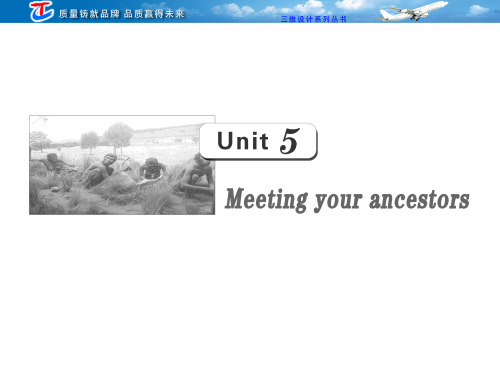
2.Abruptly she sat down,only to be scooped up by her
(excavate) here for many years.After finding human and
animal bones 3. in those caves higher up the hill as well as tools and ornaments,they think 4. it reasonable to assume some of the earliest people lived in these caves,regardless
运用:完成下列句子。
①你可以结婚也可以仍做单身汉,任你选择。
You have bachelor. ②我除了接受该项提议之外,别无选择。 I
had no alternative but to accept the alternative of
marrying or remaining a
the offer.
根据课文内容完成下列短文。 A group of students from England has come to the Zhoukoudian Cave for a visit.1.An archaeologist is showing them around.The archaeologists 2. have been excavating
高考英语复习话题13选修8Unit5 Meeting your ancestors
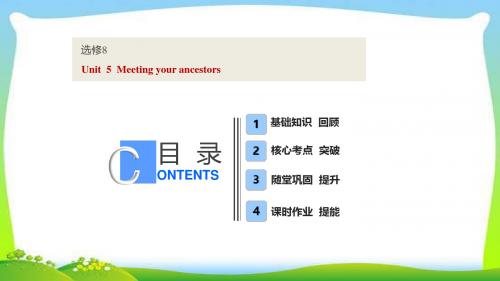
首页
上页
下页
尾页
[单词回顾· 会拓展 ]
填一填 练一练 3.后缀 背一背 en 构成的动词集锦
5.While working out ①sharp→sharpen 磨快; 使敏捷 the problem,you ②ripe→ripen 变成熟 should pay more ③short→shorten 变短;缩短 12. alternative attention to the ④wide→widen (使)变宽 可能的选择 accuracy 名 n. .You ⑤deep→deepen 使变深 词 adj.供选择的; must measure the length accurately ⑥strong→strengthen 加强 其他的 ⑦fright→frighten (使)惊吓 in order to get the accurate number. ⑧dark→darken 使变暗 (accurate) ⑨hard→harden 使变硬 ⑩loose→loosen (使)变松
(sharpen)
基础知识 回顾 核心考点 突破 随堂巩固 提升
有几分;颇为
课时作业 提能
首页
上页下页尾页[单词回顾· 会拓展 ]
填一填 5. arrest 练一练 背一背 3.“Give her a 1.somehow 相关单词一览 big round of ①somehow adv. 不知为什么
assumption
. ④somewhat adv.有点儿; 有几分;颇为
课时作业 提能
(assume)
基础知识 回顾 核心考点 突破 随堂巩固 提升
首页
上页
下页
尾页
[单词回顾· 会拓展 ]
(复习指导)选修八Unit5 Meetingyourancestors含解析
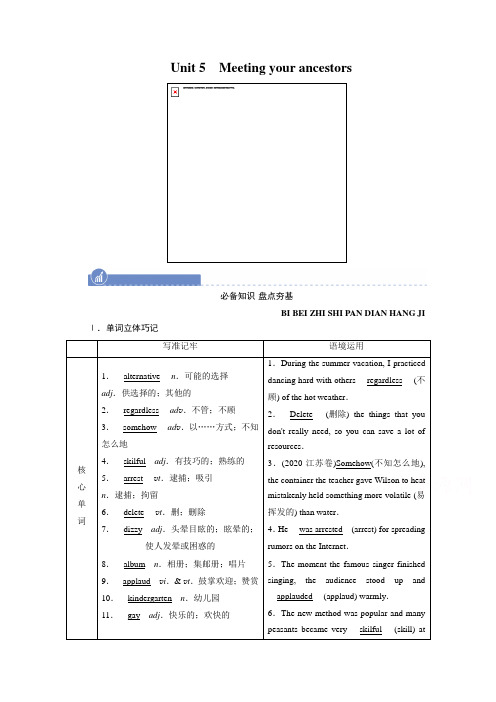
Unit 5Meeting your ancestors必备知识·盘点夯基BI BEI ZHI SHI PAN DIAN HANG JI Ⅰ.单词立体巧记写准记牢语境运用核心单词1.__alternative__ n.可能的选择adj.供选择的;其他的2.__regardless__ ad v.不管;不顾3.__somehow__ ad v.以……方式;不知怎么地4.__skilful__adj.有技巧的;熟练的5.__arrest__ v t.逮捕;吸引n.逮捕;拘留6.__delete__ v t.删;删除7.__dizzy__adj.头晕目眩的;眩晕的;使人发晕或困惑的8.__album__n.相册;集邮册;唱片9.__applaud__v i.& v t.鼓掌欢迎;赞赏10.__kindergarten__n.幼儿园11.__gay__adj.快乐的;欢快的1.During the summer vacation, I practiceddancing hard with others __regardless__ (不顾) of the hot weather.2.__Delete__ (删除) the things that youdon't really need, so you can save a lot ofresources.3.(2020·江苏卷)Somehow(不知怎么地),the container the teacher gave Wilson to heatmistakenly held something more volatile (易挥发的) than water.4.He __was arrested__(arrest) for spreadingrumors on the Internet.5.The moment the famous singer finishedsinging, the audience stood up and__applauded__ (applaud) warmly.6.The new method was popular and manypeasants became very __skilful__ (skill) at联想积累:1.“v.-ing”形式的介词、连词小结①assuming conj.假设;假定②considering prep.&conj.鉴于;考虑到③including prep.包含;包括④supposing conj.假设;假如⑤providing conj.假设;如果⑥concerning prep.关于2.多种“选择”供你选①pick v.挑选②optional adj.可选择的③choice n.选择④choose v.选择⑤select v.挑选⑥elect v.推举;选择⑦alternative n.可能的选择3.-cy名词后缀词速记①accuracy 准确;精确②efficiency 效率;效能③fluency 流畅;流利④emergency 紧急情况⑤tendency 倾向;趋势⑥agency 代理;中介⑦currency 货币;通货Ⅱ.短语语境助记写准记牢语境运用1.__regardless of__不管;不顾2.__at most__至多;最多3.__keep out __不准进入4.__(be) fed up with__受够了;饱受;厌烦5.__look ahead__向前看;为将来打算6.__date back (to...)__追溯到;始于7.__with relief__ 如释重负8.__cut up__切碎9.__take turns to do sth.__轮流做某事10.__can't/couldn't help doing sth.__禁不住做某事语境运用1.The librarian told us that we could borrow __at most__ three books at a time.2.Whenever we are in trouble, we must __look ahead__ and encourage ourselves.3.I believe everyone,__regardless of__ age or background, can come up with new ideas and excellent insights.4.To make the soup, you should first __cut up__ some carrots and beef into small pieces and then put them into the pot.5.For example, when you __are fed up with__ all the people sometimes, it is better for you to find a quiet place, listening to some classical music.6.Having finished all the housework, Mary dropped herself into the sofa, sighing __with relief __.Ⅲ.句式运用速记快到目的地的时候,一阵香气扑鼻,她停了下来,不往前走了。
高中英语选修8_Unit_5_Meeting_your_ancestors--speaking_教案(人教新课标)
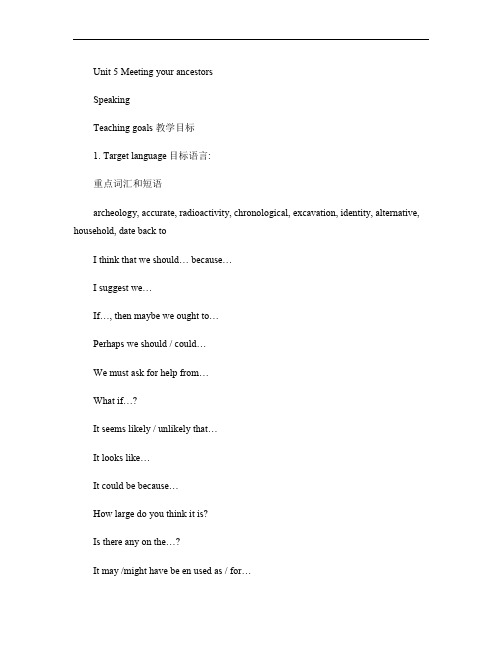
Unit 5 Meeting your ancestorsSpeakingTeaching goals 教学目标1. Target language目标语言:重点词汇和短语archeology, accurate, radioactivity, chronological, excavation, identity, alternative, household, date back toI think that we should… because…I suggest we…If…, then maybe we ought to…Perhaps we should / could…We must ask for help from…What if…?It seems likely / unlikely that…It looks like…It could be because…How large do you think it is?Is there any on the…?It may /might have be en used as / for…2. Ability goals能力目标Enable the students to talk about the archaeological evidence and knowledge and learn to describe people and practice giving opinions.3. Learning ability goals 学能目标Help the students learn how to give opinion and describe objectsTeaching important & difficult points教学重难点Learn how to give opinion and describe objectsTeaching methods教学方法Listening and cooperative learningTeaching aids教具准备A computer, a tape recorder and a projector.Teaching procedures & ways教学过程与方法Step I Lead-inLead in by talking about the ancient civilization.1.Ask them the four Great Ancient Civilizations.2.Ask them to give some account of each great civilization, for example, speaking China, theycan talk about China’s brilliant civilization, like four great inventions (papermaki ng, printing, gunpowder, compassStep II Warming-upDeal with the Warming-up part.1.Ask Ss to identify each picture in this part.2.Ask them to have a discussion to complete the task listed in Activity 2 ( to complete the table,What is it mad e of? What’s its use? And today’s alternatives?3.Then make a summary of this and show the PPT of the table list on the screen.S3. The Greek Goddess agreed to help and his wish was granted.Step III SpeakingTalk about Sanxindui Ruins with Ss.1.Show the pictures on page 44. Tell the Ss they were found during an excavation in SanxinduiRuins.2.Ask them if they know anything about SanXindui Ruins.3.Introduce some background information to them.4.Show a series of objects to them and ask them to complete the tasks shown on the screen.1.Guess what they are.2.Discuss what these objects were possibly used for3.Describe these objects (including appearance, shape and a guess about the material, whatcan we learn from these objects, etc.StepⅣ ListeningDo the Listening task on page 81.Step V HomeworkAsk the students to find some information about Zhoukoudian.。
选修8 Unit 5 Meeting your ancestors

Unit 5 Meeting your ancestors Ⅰ.重要单词聚焦1.n.可能的选择adj. 供选择的;其他的2.n. 挨饿;饿死3.vt.& vi. 打断……讲话;打岔;暂时中断或中止4.vt. 假定;设想5.adv. 不管;不顾alternativestarvationinterruptassumeregardless6.vi.& vt. (使)锋利;尖锐;清晰7.adj. 原始的;远古的;简陋的8.n. 意义;意思;重要性;重要意义9.adv. 以……方式;不知怎么地10.n. 幼儿园11.n. 分割;划分;分配;分界线12.vi.& vt. 鼓掌欢迎;赞赏13.vi.& vt. 加速;促进14.vt. 逮捕;吸引n. 逮捕;拘留15.adj. 晕眩的;使人发晕或困惑的sharpenprimitivesignificancesomehowkindergartendivisionapplaudacceleratearrestdizzyⅡ.重点短语扫描1.of 不管;不顾2.at 至多;最多3.cut 切碎4.fed up 受够了;饱受;厌烦5.look 向前看;为将来打算6.Date 追溯到……7.concentrate 集中8.search 寻找9.take to do sth. 轮流干某事10.can’t/couldn’t doing禁不住干某事regardlessmostupwithaheadbackonforturnshelpⅢ.课文原句突破1.If only it could be just like last year![信息提取]if only意为“但愿……,要是……就好了……”。
[例句仿写]要是当时我接受你的建议就好了!________ ________ ________ ________ ________ ________ ________then!【答案】If only I had followed your advice2.We have been excavating layers of ash almost six meters thick,which suggests that they might have kept the fire burning all winter.[信息提取]suggest意为“暗示,表明”。
高中英语高三选修8 Unit5 Meeting your ancestors Reading (Ⅰ)

lived.
Answer the following questions after a careful reading.
1.Where did early people live? 2.How did they keep warm? 3. What animals were their most dangerous enemies? 4.What did they use to cut up animals and remove their skin? 5.What did they eat? 6. What can we learn from the necklace they wore?
3. What animals were their most dangerous enemies? Tigers and bears were their most dangerous enemies.
4. What did they use to cut up animals and remove their skin?
Write down three ways in which the life of early people differs from modern ones
Homes Caves, perhaps with skins to
keep out the cold
高考英语复习 选修八Unit 5 Meeting your ancestors Word版含解析

[基础巩固]单句语法填空1.The pupil can't even sharpen(sharp) a pencil properly.2.Heart of appreciation is of great significance in our lives.3.He added that probiotics(益生菌)were not an alternative to a healthy diet.4.It is commonly assumed(assume) that the growth of GDP and the development of people's living conditions are not necessarily cause and effect.5.The escaped prisoner got arrested(arrest) immediately he turned up at the railway station and was sent to prison again.6.In contrast to our ignorance of saving food,many people especially those in poverty-stricken areas are suffering from starvation(starve).7.It is very annoying to_be_interrupted(interrupt) by advertisement at intervals.8.Marty has_been_working(work) really hard on his book and he thinks he'll have finished it by Friday.9.He hurried to the airport only to_be_told(tell) that the film star had left.10.—I didn't see you at the concert last week.What a pity!—If only I had_afforded(afford) the time.[能力提升]Ⅰ.阅读理解Money_with_no_strings_attached.It's not something you see every day.But at Union Station in Los Angeles last month, a board went up with dollar bills attached to it with pins and a sign that read, “Give What You Can, Take What You Need.”People quickly caught on.And while many took dollars, many others pinned their own cash to the board.“People of all ages, races, and socio-economic(社会经济的)backgrounds gave and took,”said Tyler Bridges of The Toolbox, which created the project.“We even had a bride in her wedding dress come up to the board and take a few dollars.” Most of the bills on the board were singles, but a few people left fives, tens and even twenties.The video clip(片段)shows one man who had found a $20 bill pinning it to the board.“What I can say for the folks that gave the most, is that they were full of smiles,” Bridges said.“There's a certain feeling that giving can do for you and that was apparent in those that gave the most.” Most people who took dollars took only a few, but Bridges said a very small number took as much as they could.While the clip might look like part of a new ad campaign, Bridges said the only goal was toshow generosity and sympathy.He added that he hopes people in other cities might try similar projects and post their own videos on the Internet.“After all, everyone has bad days and good days,” he said.“Some days you need a helping hand and some days you can be the one giving the helping hand.”[语篇导读]这是一篇新闻报道。
2020年高考英语复习《选修八 Unit 5 Meeting your ancestors》:核心句型
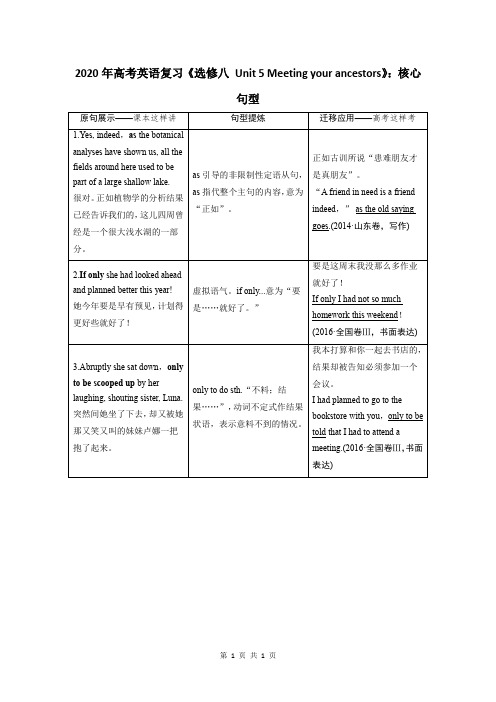
她今年要是早有预见,计划得更好些就好了!
虚拟语气。if only...意为“要是……就好了。”
要是这周末我没那么多作业就好了!
If only I had not so much homework this weekend!(2016·全国卷Ⅲ,书面表达)
3.Abruptly she sat down,only to be scooped upby her laughing, shouting sister, Luna.
突然间她坐了下去,却又被她那又笑又叫的妹妹卢娜一把抱了起来。
on料不到的情况。
我本打算和你一起去书店的,结果却被告知必须参加一个会议。
I had planned to go to the bookstore with you,only to be toldthat I had to attend a meeting.(2016·全国卷Ⅲ,书面表达)
很对。正如植物学的分析结果已经告诉我们的,这儿四周曾经是一个很大浅水湖的一部分。
as引导的非限制性定语从句,as指代整个主句的内容,意为“正如”。
正如古训所说“患难朋友才是真朋友”。
“A friend in need is a friend indeed,”as the old saying goes.(2014·山东卷,写作)
2020年高考英语复习《选修八Unit 5 Meeting your ancestors》:核心句型
原句展示——课本这样讲
句型提炼
迁移应用——高考这样考
1.Yes, indeed,asthe botanical analyses have shown us, all the fields around here used to be part of a large shallow lake.
2022届高考英语大一轮复习讲义:选修8 Unit 5 Meeting your ance
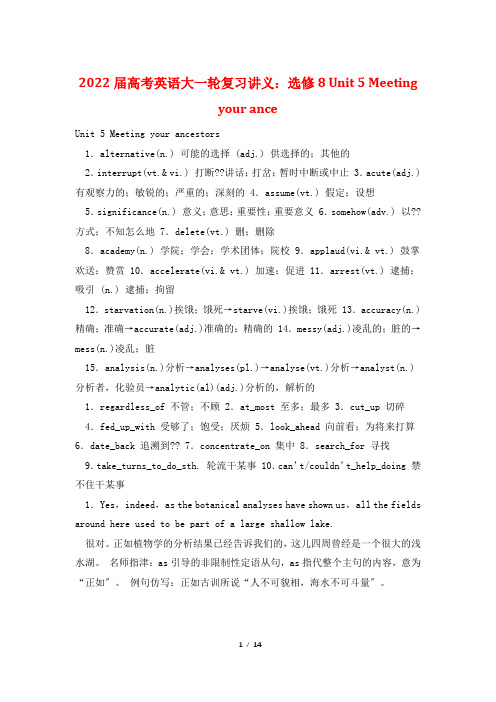
2022届高考英语大一轮复习讲义:选修8 Unit 5 Meetingyour anceUnit 5 Meeting your ancestors1.alternative(n.) 可能的选择 (adj.) 供选择的;其他的2.interrupt(vt.& vi.) 打断??讲话;打岔;暂时中断或中止 3.acute(adj.) 有观察力的;敏锐的;严重的;深刻的 4.assume(vt.) 假定;设想5.significance(n.) 意义;意思;重要性;重要意义 6.somehow(adv.) 以??方式;不知怎么地 7.delete(vt.) 删;删除8.academy(n.) 学院;学会;学术团体;院校 9.applaud(vi.& vt.) 鼓掌欢送;赞赏 10.accelerate(vi.& vt.) 加速;促进 11.arrest(vt.) 逮捕;吸引 (n.) 逮捕;拘留12.starvation(n.)挨饿;饿死→starve(vi.)挨饿;饿死 13.accuracy(n.)精确;准确→accurate(adj.)准确的;精确的 14.messy(adj.)凌乱的;脏的→mess(n.)凌乱;脏15.analysis(n.)分析→analyses(pl.)→analyse(vt.)分析→analyst(n.)分析者,化验员→analytic(al)(adj.)分析的,解析的1.regardless_of 不管;不顾 2.at_most 至多;最多 3.cut_up 切碎4.fed_up_with 受够了;饱受;厌烦 5.look_ahead 向前看;为将来打算6.date_back 追溯到?? 7.concentrate_on 集中 8.search_for 寻找9.take_turns_to_do_sth. 轮流干某事 10.can’t/couldn’t_help_doing 禁不住干某事1.Yes,indeed,as the botanical analyses have shown us,all the fields around here used to be part of a large shallow lake.很对。
- 1、下载文档前请自行甄别文档内容的完整性,平台不提供额外的编辑、内容补充、找答案等附加服务。
- 2、"仅部分预览"的文档,不可在线预览部分如存在完整性等问题,可反馈申请退款(可完整预览的文档不适用该条件!)。
- 3、如文档侵犯您的权益,请联系客服反馈,我们会尽快为您处理(人工客服工作时间:9:00-18:30)。
Ⅰ.阅读理解AI used to believe courtesy was a thing of the past. Very seldom have I encountered a courteous human being in this modern era.Recently, I had to change my thinking, when I came face to face with just such a human being in a coffee place, with my two daughters. The place was crowded as usual and we had to climb steep (陡峭) stairs in order to find an empty table. After enjoying coffee and snacks, we went down the narrow stairs, where there was hardly any space for another person to either climb up or come down.Just as I was in the middle of the stairs, a gentleman entered the main entrance of the restaurant which was right in front of the staircase (楼梯). I was sure I would be pushed roughly by this man going up. I kept coming down as fast as I could. My daughters were already down, looking up at me worriedly, and hoping I would reach them before the stranger started walking up the stairs, knowing I was a nervous sort.Nearly reaching them, I noticed the man still standing near the door. I reached my daughters and passed the stranger at the entrance door which he kept holding open. I looked back thinking he was still at the door, deciding whether to go in or find another less crowded place. I saw him going up the stairs, two at a time. I told my daughters about it and all three of us felt bad that we did not even thank the courteous gentleman who was actually holding the door open for us ladies to pass through before going up.Such well-mannered people are hard to find these days, when pushing is very common in our advanced but aggressive society. We applauded him for his chivalry (彬彬有礼).[语篇解读]本文为一篇记叙文。
本文通过讲述自己的亲身经历告诉读者,现在社会尽管懂得礼节的人不多,但毕竟还存在着一些懂礼节的人。
1.What is the meaning of the underlined word “courtesy” in Paragraph 1?A.A brave action.B.Sacrifice spirit.C.A considerate action. D.Selfish behavior.解析:词义猜测题。
根据文中男子为女士让路和开门等行为可知他是一个善解人意、彬彬有礼的人,由此可推出courtesy意为:为他人着想的行为,故答案为C项。
答案:C2.What did the author think of the man at the first sight of him?A.He was in a hurry.B.He would wait for her.C.He would push her rudely.D.He was a man with good manners.解析:细节理解题。
根据第三段中的“I was sure I would be pushed roughly by this man going up.”可知,作者第一眼看到那个男士时以为他会粗鲁地推开她上楼梯,故答案为C项。
答案:C3.Why did the author's daughters worry about her?A.She was easy to be nervous.B.She took up too much space.C.She was too old to walk fast.D.She focused too much on the man.解析:细节理解题。
根据第三段最后一句“My daughters were already down,looking up at me worriedly...knowing I was a nervous sort.”可知作者的女儿们担心她的原因是:她是一个很容易紧张的人,故答案为A项。
答案:A4.What can we learn about the man from Paragraph 4?A.He might be a waiter of the café.B.He might have an urgent business to do.C.He loved a daughter of the author.D.He would hold the door open for all.解析:推理判断题。
根据第四段中“I saw him going up the stairs,two at a time.”可知,那位男士可能有急事要做,故答案为B项。
答案:BBCan you figure out someone's name just by looking at him or her?The answer may not be a definit e “yes”,but a study by the Hebrew University of Jerusalem, Israel, found that you would at least have a clue, since people with certain names tend to share similar facial appearances.For example, if someone is named Bob, he's likely to have a round and joyful face, while someone named Tim tends to have a narrower face and a more serious look.People have long been associating names with certain cultural expectations, which may be responsible for the study's results. For example, a woman named Katherine is usually considered to be more reliable than a girl named Bonnie. Previous studies also found that people with traditionally African-American names such as DeShawn and Jamal are more likely to be seen as dangerous and violent by their teachers and are less likely to be hired in jobs.These stereotypes (模式化概念) have become so widespread that they've even affected how people look at themselves. In fact, people tend to subconsciously (下意识地) change their own personalities to fit into these stereotypes—Katherines may try hard to be trustworthy and Bonnies may care less about the mistakes they make.“We develop the personality that other people expect us to exhibit,”said lead researcher Yonat Zwebner, according to The Telegraph. In other words, it's not that names change people, but people try to live up to their names.And our faces may even change over time, based on these stereotypes.“Usually, we think that faces are very fixed but now we show that they're not,”the study's co-author Ruth Mayo told UK's iNe w s.According to Mayo, the use of different facial expressions can allow people to develop different looks. “If you smile a lot, you have different wrinkles around your eyes and your mouth from if you frown(皱眉)a lot,” she said.[语篇解读]本文主要讨论了是否可以通过相面而识人名的问题。
